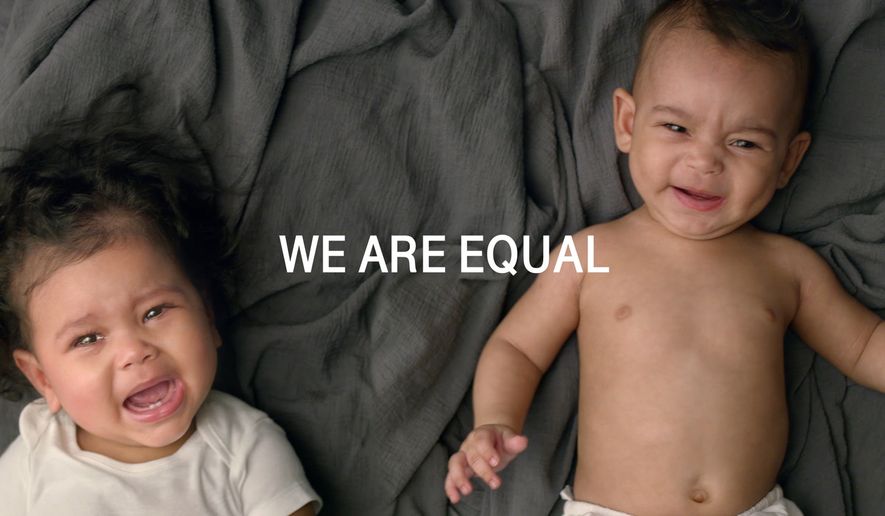An ad from a veterans’ group asking people to #PleaseStand was deemed too political for the Super Bowl, but not a commercial advocating on behalf of equal pay, a favorite Democratic Party rallying cry.
Conservatives called foul after a T-Mobile ad airing during Super Bowl LII made a plug for “fair and equal pay,” referring to the left’s much-disputed contention that U.S. women earn less than men as a result of discrimination.
The T-Mobile spot features narrator Kerry Washington telling a group of babies, “Some people may see your differences and be threatened by them, but you are unstoppable.”
“You’ll love who you want, you’ll demand fair and equal pay, you will not allow where you come from to dictate where you’re going,” she says.
The problem? The wage-gap debate is far from settled. Advocates point to statistics showing that women earned on average 82 cents for every dollar earned by men in 2016, while critics counter that the discrepancy all but disappears after adjusting for factors such as hours worked, occupation and employment gaps.
The blurb riled conservatives still simmering over the NFL’s decision last month to turn down an American Veterans print ad for the Super Bowl program over the message #PleaseStand.
“Ugh, awful @TMobile ad. That was okay to run, but not the AmVets ad?” tweeted conservative pundit Dana Loesch.
Ugh, awful @TMobile ad. That was ok to run but not the AmVets ad? 🙄 #SuperBowl
— Dana Loesch (@DLoesch) February 5, 2018
Everyone I am watching the #SuperBowl with is talking about how they are cancelling their T-Mobile plans after that political commercial.
— Ryan Saavedra 🇺🇸 (@RealSaavedra) February 5, 2018
The NFL said in a statement that the #PleaseStand ad ran afoul of its policy against running advertising in the program that could be “considered by some as a political statement,” given its reference to the take-a-knee protests during the national anthem.
Why allow one ad and not the other? “I think it’s a pretty clear double standard,” said Brittany Hughes, the conservative Media Research Center’s television managing editor.
“It’s pretty much beyond obvious at this point that the NFL is not committed to being apolitical like they claim,” said Ms. Hughes. “If they had truly wanted to stay out of politics, they would have never run the T-Mobile ad, because the entire thing was political.”
The NFL did not respond immediately to a request for comment Monday on the apparent discrepancy, nor did NBC, which broadcast Super Bowl LII.
AMVETS has accused the NFL of “corporate censorship,” while others have pointed out that the NFL showed no such reluctance to run politically themed ads in last year’s Super Bowl, including thinly veiled blasts at President Trump on immigration and the pay gap.
“Super Bowl 51 Completes the Left’s Hyper-Politicization of Absolutely Everything,” said the Daily Wire’s John Nolte in a post afterward.
Ads running during this year’s game were occasionally preachy but far less partisan, prompting CNN to declare that Super Bowl LII “pulled punches on Trump.”
The most controversial spot of the night had nothing to do with party politics: A Dodge Ram commercial came under attack for using a 1968 sermon by the Rev. Martin Luther King Jr. to sell trucks.
“Given the fact that Trump dominates the news cycle, there was strong aversion to those types of ads,” Fabric Media brand analyst Jason Damata told CNN. “Trump was the third rail in that no one went there. They all went after the things that bring us together. They took advantage of the moment.”
The Super Bowl did feature a salute to veterans. Fifteen Medal of Honor recipients were recognized during Sunday’s pre-game coin-toss ceremony, and 94-year-old Marine veteran Hershel “Woody” Williams, an AMVETS member, flipped the coin as part of the live broadcast.
“The NFL is proud to honor our nation’s heroes at Super Bowl LII,” said NFL commissioner Roger Goodell in a statement. “These courageous individuals deserve to be recognized on America’s biggest stage. We are grateful for their service to our country and we are pleased to continue the NFL’s longstanding tradition of hosting special tributes to service members at the Super Bowl.”
One distinction between the ads by AMVETS and T-Mobile is that they were designed for different media platforms. The #PleaseStand ad was submitted for the Super Bowl print program, which is overseen by the NFL.
It’s unclear how much input the NFL has as opposed to the network in determining which ads will run during the Super Bowl, although the league apparently has some say-so over content.
A GNC ad slated to run last year was nixed by the NFL as a result of its ban on advertising supplements, according to Fortune.
“This is the NFL. This is their game,” said Ms. Hughes. “If they really wanted to put their foot down and say, ’No political ads at all,’ then they could have absolutely done so. Or at least release a statement saying, ’Hey, we didn’t have control over this, T-Mobile ran its ad,’ and at least absolve themselves of it. They haven’t made a statement at all.”
The cost of a Super Bowl ad is reportedly about $5 million for a 30-second spot.
The Super Bowl is inevitably the highest-rated broadcast of the year, but this year’s game saw ratings drop by 7 percent from the previous year, with an average of 103.4 million viewers, making it the lowest-rated championship since 2009, according to Variety.
• Valerie Richardson can be reached at vrichardson@washingtontimes.com.




Please read our comment policy before commenting.